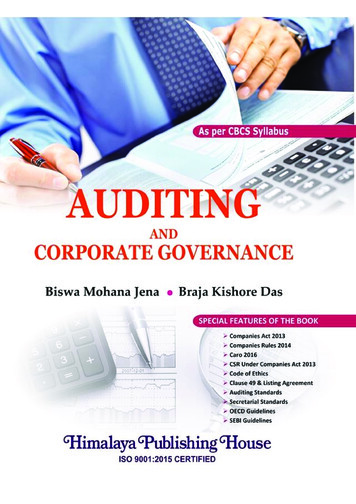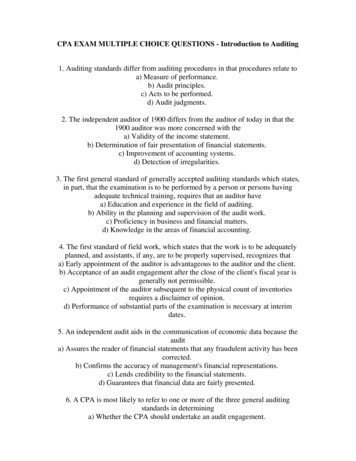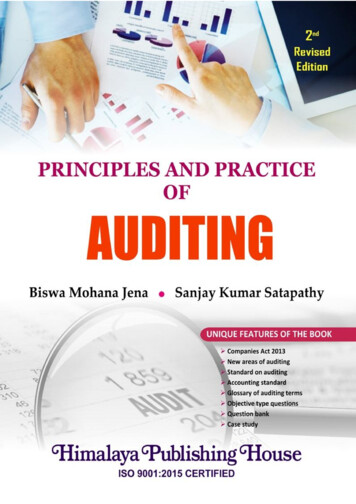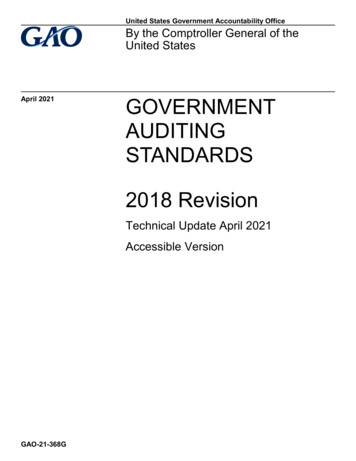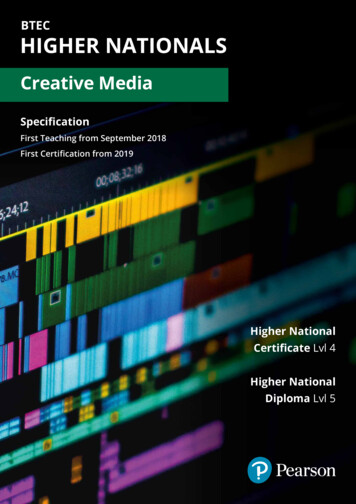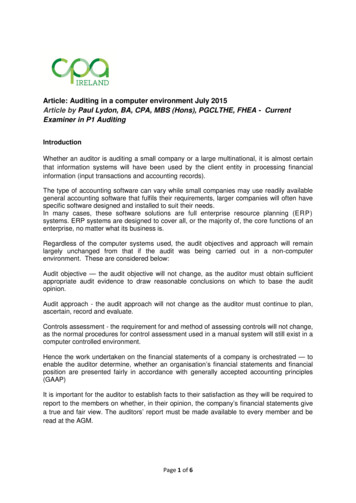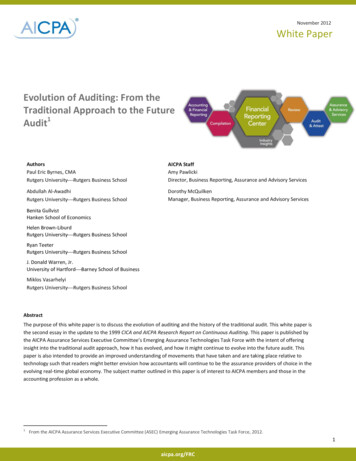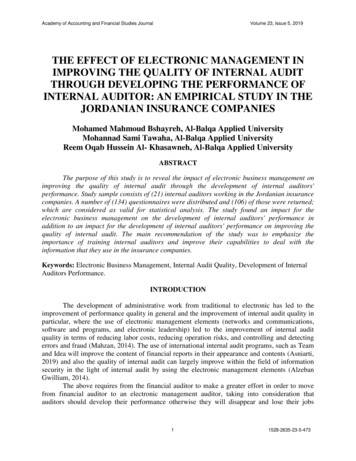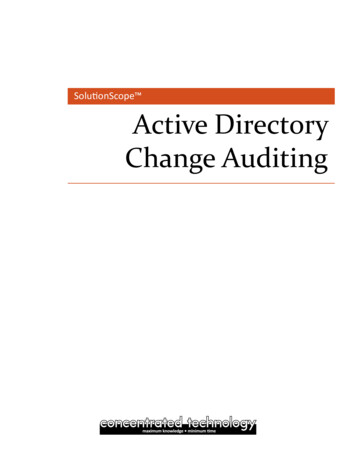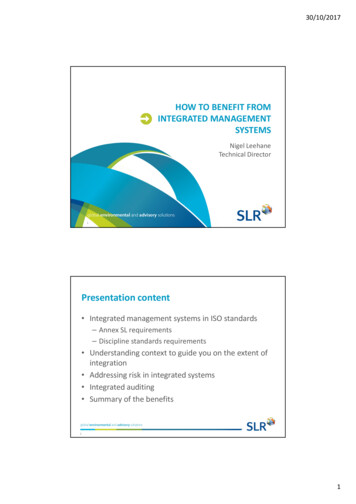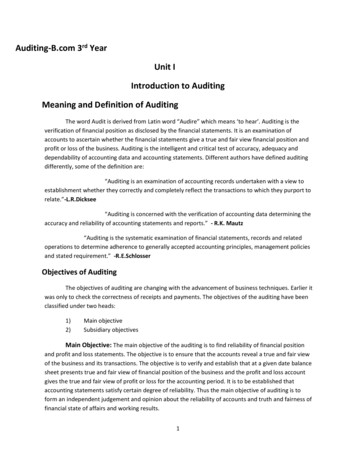
Transcription
Auditing-B.com 3rd YearUnit IIntroduction to AuditingMeaning and Definition of AuditingThe word Audit is derived from Latin word “Audire” which means ‘to hear’. Auditing is theverification of financial position as disclosed by the financial statements. It is an examination ofaccounts to ascertain whether the financial statements give a true and fair view financial position andprofit or loss of the business. Auditing is the intelligent and critical test of accuracy, adequacy anddependability of accounting data and accounting statements. Different authors have defined auditingdifferently, some of the definition are:“Auditing is an examination of accounting records undertaken with a view toestablishment whether they correctly and completely reflect the transactions to which they purport torelate.”-L.R.Dicksee“Auditing is concerned with the verification of accounting data determining theaccuracy and reliability of accounting statements and reports.” - R.K. Mautz“Auditing is the systematic examination of financial statements, records and relatedoperations to determine adherence to generally accepted accounting principles, management policiesand stated requirement.” -R.E.SchlosserObjectives of AuditingThe objectives of auditing are changing with the advancement of business techniques. Earlier itwas only to check the correctness of receipts and payments. The objectives of the auditing have beenclassified under two heads:1)2)Main objectiveSubsidiary objectivesMain Objective: The main objective of the auditing is to find reliability of financial positionand profit and loss statements. The objective is to ensure that the accounts reveal a true and fair viewof the business and its transactions. The objective is to verify and establish that at a given date balancesheet presents true and fair view of financial position of the business and the profit and loss accountgives the true and fair view of profit or loss for the accounting period. It is to be established thataccounting statements satisfy certain degree of reliability. Thus the main objective of auditing is toform an independent judgement and opinion about the reliability of accounts and truth and fairness offinancial state of affairs and working results.1
Subsidiary objectives: The subsidiary objectives of the auditing are:1. Detection and prevention of fraud: the one of the important subsidiary objective ofauditing is the detection and prevention of fraud. Fraud refers to intentionalmisrepresentation of financial information. Fraud may involve:a. Manipulation, falsification or alteration of records or documentsb. Misappropriation of assets.c. Suppression of effect of transactions from records or documents.d. Recording of transactions without substance.e. Misapplication of accounting policies2. Detection and prevention of errors: is another important objective of auditing. Auditingensures that there is no mis-statement in the financial statements. Errors can be detectedthrough checking and vouching thoroughly books of accounts, ledger accounts, vouchersand other relevant information.Importance of AuditingImportance of auditing can be judged from the fact that even those organizations which arenot covered by companies Act get their financial statements audited. It has become a necessity forevery commercial and even non- commercial organization. The importance of auditing can be summedin following points:a. Audited accounts help a sole trader in knowing the value of the business for thepurpose of sale.b. Dispute over correctness of profits can be avoided.c. Shareholders, who do not know about day-to-day administration of the company ,can judge the performance of management from audited accounts.d. It helps management in detecting and preventing errors and frauds.e. Management gets advice on financial affairs from the auditors.f. Long and short term creditors depend on audited financial statements while takingdecision to grant credit to business houses.g. Taxation authorities depend on audited statements in assessing the income tax,sales tax and wealth tax liability of the business.h. Audited accounts are useful for the government while granting subsidies etc.i. It can be used by insurance companies to settle the claims arising on account of lossby fire.j. Audited accounts serve as a basis for calculating purchase consideration in case ofamalgamation and absorption.k. It safe guards the interests of the workers because audited accounts are useful forsettling trade disputes for higher wages or bonus.2
Types of auditBased on ownership: On the basis of ownership audit can be:1. Audit of Proprietorship: In case of proprietary concerns, the owner himself takes thedecision to get the accounts audited. Sole trader will decide about the scope of audit andappointment of auditor. The auditing work will depend upon the agreement of audit and thespecific instructions given by the proprietor.2. Audit of Partnership: To avoid any misunderstanding and doubt, partnership auditstheir accounts. Partnership deed on mutual agreement between the partners may providefor audit of financial statements. Auditor is appointed by the mutual consent of all thepartners. Rights, duties and liabilities of auditor are defined in the mutual agreement andcan be modified by the partners.3. Audit of Companies: Under companies Act, audit of accounts of companies in Indiais compulsory. Chartered accountant who is professionally qualified is required for the auditof accounts of companies. Companies Act 1913 for the first time made it compulsory forjoint stock companies to get their accounts audited from a qualified accountant. A numberof amendments have been made in companies Act, 1956 and 2013 regarding appointment,duties, qualification, power and liabilities of a qualified auditor.4. Audit of Trusts: The beneficiaries of the trusts may not have access andknowledge of accounts of the trust. The trustees are appointed to manage and look afterthe property and business of the trust. Accounts of the trust are maintained as per theconditions and terms of the trust deed. The income of the trust is distributed to thebeneficiaries. There are more chances of frauds and mis-appropriation of incomes. In thetrust deed as well as in the Public Trust Act which provide for compulsory audit of theaccounts of the trust by a qualified auditor. The audited accounts of the trust ensure trueand fair view of accounts of the trust.5. Audit of Accounts of Co-operative Societies: Co-Operative societies areestablished under the Co-Operative Societies Act, 1912. It contains variousprovisions for the regulations and the working of these societies. Some of the stateshave adopted it without any change, while others have brought certain changes toit. The auditor of the Co-operative Society should have an expert knowledge of theparticular act under which Co-operative society under audit is functioning. He should alsostudy by-laws of the society and make sure that the amendments made from time to time inthe by-laws have been duly registered in the Registrar’s Office. Companies Act is notapplicable to the co-operative Societies. The Registrar of co-operative societies shall audit orcause to be audited by some person authorized by him, the accounts of the society once inevery financial year.3
6. Government Audit: Audit of government offices and departments is covered underthis heading. A separate department is maintained by government of India known asAccounts and Audit Department. This department is headed by the Comptroller and AuditorGeneral of India. This department works only for the government offices and departments.This department cannot undertake audit of non-government concerns. Its working is strictlyaccording to government rules and regulations.Based on Time:On the basis of time the audit can be of following types:1. Interim Audit: When an audit is conducted between two annual audits, such audit isknown as Interim audit. It may involve complete checking of accounts for a part of the year.Sometimes it is conducted to enable the board of directors to declare an Interim dividend. Itmay also be for the purpose of dealing with interim figures of sales.2. Continuous Audit: The Continuous Audit is conducted throughout the year or at theregular short intervals of time.“A continuous audit involves a detailed examination of all the transactions by theauditor attending at regular intervals say weekly, fortnightly or monthly, during the wholeperiod of trading.” - T.R. Batliboi“A continuous audit is one where the auditor or his staff is constantly engaged inchecking the accounts during the whole period or where the auditor or hiss staff attends atregular or irregular intervals during the period.” -R.C WilliamsAdvantages of continuous Audit:a. Complete checking of all the records: Since the audit is carried outthroughout the year, sufficient time is available for detailed checking. Any enquiryand doubt arising in the course of audit can be tackled in a better way.b. Proper planning: Auditor can plan his audit work in a systematic manner. Hecan evenly spread his work throughout the year. It will improve efficiency of auditor.c. Early detection of frauds and errors: The work of auditor becomes easierfor detecting frauds and errors, otherwise it will involve more time.d. Up-to-date accounts: The efficiency of account staff will increase and theirwork will be up-to-date and accurate.e. Valuable suggestions: Continuous audit will help the auditor to understandthe technicalities of business. This will help the auditor to make suggestions for theimprovement of business.4
f. Preparation of interim accounts: Interim accounts can be preparedwithout much delay. It will help the Board of Directors to declare interim dividend.Disadvantages of Continuous Audit:a. Expensive: It is an expensive system as it may not suit the budget of smallorganizations.b. Dislocation of routine work: Frequent visits by auditor may dislocate thesmooth flow of office work.c. Alteration of Figures: after the accounts have been audited, the figures maybe fraudulently altered by the staff.d. Losing link in the audit work: As the work is not completed continuously,the auditor may lose continuity and certain questions and inquires may be leftunanswered.3. Final Audit: Final Audit means when the audit work is conducted after the close offinancial year. A final audit is commonly understood to be an audit which is not commenceduntil after end of the financial period and is then carried on until completed.4. Balance Sheet Audit: Balance Sheet Audit relates to the verification of various items ofbalance sheet such as assets, liabilities, reserves and surplus, provisions and profit and lossbalance. The procedure under this audit is to follow a backward process. First the item islocated in balance sheet, and then it is located in original record for the purpose ofverification.Based on Objectives: On the basis of objectives the audit can be of following types:1. Internal Audit: It implies the audit of accounts by the staff of the business. Internal auditis an appraisal activity within an organization for the review of the accounting, financial andother operations as basis for protective and constructive service to the management. It is atype of control which functions by measuring and evaluating the effectiveness of othertypes of control. It deals primarily with accounting and financial matters but it may alsoproperly deal with matters of operating nature.2. Cost Audit: Cost Audit is the verification of the correctness of cost accounts andadherence to the cost accounting plans. Cost Audit is the detailed checking of costingsystem, techniques and accounts to verifying correctness and to ensure adherence to theobjectives of cost accounting.3. Secretarial Audit: Secretarial Audit is concerned with verification compliance by thecompany of various provisions o Companies Act and other relevant laws. Secretarial auditreport includesa. Whether the books are maintained as per companies act, 2013.5
b. Whether necessary approvals as required from central Government, Company lawboard or other authorities were obtained.4. Independent Audit: Is conducted by the independent qualified auditor. The purpose ofindependent audit is to see whether financial statements give true and fair view of financialposition and profits. Mainly it is for safeguarding the interest of owners, shareholders andother parties who do not have knowledge of day-to-day operations of organization.5. Tax Audit: Now-a-days tax audit has become very important to ascertain the accuracy oftax related documents. Tax audit mostly covers income returns, invoices, debit and creditnotes and various current and fixed assets. Tax audit is an innovation of 21st century. It hasadded one more chapter to the practice of auditing. Tax audit ensures the validity andcredibility of tax related documents.Unit 2Planning of Audit and ControlQualities of an Auditor:The Auditor must possess the following qualifications and qualities:1. Only the qualified chartered accountant can be appointed as auditor of a limited company.2. The auditor must have thorough knowledge of principles and practice of all aspects ofaccountancy. He must be familiar with all systems of accountancy in use.3. He should have adequate knowledge of financial management, industrial administration andbusiness organization.4. He must have thorough knowledge of audit case laws as per the various cases decide by thecourts in and outside India.5. He should be able to understand the technical details of business whose accounts he isgoing to audit.6. An auditor must be honest i.e. He must certify that he does not believe to be true and hemust take reasonable care and skill before he believes what he certifies is true.7. He must act impartially and not influenced by others, directly or indirectly while discharginghis duties.8. He should be hard working, systematic and methodical.9. He must have capacity to hear arguments of others.10. He should have adequate skills and courage to write audit report correctly clearly andconcisely.11. He should not disclose the secrets of his client.6
Appointment of an AuditorAppointment of Auditor in case of Sole proprietor: The appointment of Auditor in case ofsole trader is done by the owner of the business. In case of sole traders the auditor generally acts as anaccountant who also prepares accounts besides checking their accuracy. As He is appointed by anindividual he must get clear instructions from his client in writing as to what he is expected to do. Hiswork and its scope will depend upon the agreement with his client since the appointment of an auditoris not under any statute, therefore the rights and the duties will depend upon the agreement.Appointment of Auditor in case of partnership: The Auditor of a partnership firm is madeby the mutual consent of all the partnersAppointment of Companies Auditors: The provisions regarding appointment of the auditorare contained in section 139 of Companies Act 20131.2.Appointment of auditor by members [sec 139(1)]:a. A company shall appoint an individual or a firm as an Auditor at the first annualgeneral meeting and each subsequent sixth annual general meeting.b. Such auditors shall hold office till conclusion of sixth annual general meeting.c. Such appointment shall be placed before the members at each annual generalmeeting for ratification.Period for which the appointment is made [sec 139(2)]:a. An individual can be appointed for a term no more than five years.b. An audit firm can be appointed for a consecutive term not more than two termsof five years.c. An individual or a firm which has completed its term shall not be eligible forreappointment as auditor in the same company for five years from thecompletion of term.3.Appointment of auditor of Government companies (sec 139 (5)): The comptroller andAuditor general shall in respect of financial year appoint an auditor duly qualified within 180days from the commencement of financial year who shall hold office till conclusion of annualgeneral meeting.4.Appointment of First Auditor by Board of Directors [sec139 (6)]: The first auditor of acompany other than government company shall be appointed by the board of directors within30 days of registration of company. If the board fails to appoint first auditor it shall inform themembers of company who shall appoint auditor within 90 days at extra ordinary generalmeeting who shall hold the office till conclusion of first annual general meeting.5.Appointment of First Auditor of Government Company [sec 139 (7)]: The first Auditorof a Government Company shall be appointed by Comptroller and Auditor general within 60days of registration of company. In case of its failure to appoint first auditor, then board ofdirectors shall appoint auditor within next 30 days. The company shall inform the members if7
the board fails to appoint first auditor who shall appoint the auditor within 60 days at extraordinary general meeting who shall the office till conclusion of the first general meeting.6.Casual vacancy of an Auditor [sec 139 (8)]:a. The casual vacancy of auditor, except in case of Government Company, shall befilled by the board of directors within 30 days but if it arises as a result ofresignation of the auditor it shall be approved by company at general meetingconvened within 3 months o recommendation of board. Such auditor shall holdoffice till conclusion of next annual general meeting.b. Casual vacancy in case of Government Company shall be filled by Comptrollerand Auditor General within 30 days if he fails to fill the vacancy, the board shallfill the vacancy within next 30 days.Reappointment of a retiring auditor [sec 139 (9)]:Such an auditor can be reappointed at annual general meeting if.a. He is not disqualified for reappointment.b. He has not given notice to company of his unwillingness.c. A special resolution has not been passed at annual general meeting appointingsome other person or providing expressly that he shall not be reappointed.All the above is subject to the provisions of sec 139 (1)Qualifications of an Auditor:1. A person shall be eligible for the appointment of an auditor of a company only if he is achartered accountant.2. Where a firm including a limited liability partnership is appointed as an auditor of acompany, only the partners who are chartered accountants shall be authorized to act andsign on behalf of firm.Disqualifications of an Auditor:The following persons shall not be eligible for the appointment as an auditor of acompany:1. An officer or employee of the company.2. A person who is a partner, or who is in employment or an officer or employee of thecompany.3. A person or a firm who, whether directly or indirectly has business relationship with thecompany, or subsidiary of such holding company or associate company of such nature asmay be prescribed.4. A person whose relative is director or is in the employment of the company as director orkey managerial personnel.5. A person who is in full time employment elsewhere or a person or a partner of a firmholding appointment as its auditor, if such persons or partner is at the date of suchappointment or reappointment holding appointment as auditor of more than 20 companies.8
6. A person who has been convicted by a court of an offence involving fraud and a period of 10years has not elapsed from the date of such conviction.Remuneration of an Auditor (sec 142)1. The remuneration of the Auditor of a company shall be fixed in its general meeting or insuch manner as may be determined therein.2. The Remuneration under sub section (1) shall, in addition to the fee payable to an auditor,include the expenses, if any, incurred by the auditor in connection with the audit of thefacility extended to him but does not include any remuneration paid to him by any otherservices rendered by him at the request of the company.Removal, Resignation of an Auditor1. The Auditor appointed under section 139 may be removed from his office before expiry of isterm only by a special resolution of the company after obtaining the previous approval ofthe central Government.2. The Auditor who resigns from the company shall file within a period of thirty from the dateof resignation, a statement in a prescribed form with the company a registrar, the auditorshall also file such statement with the comptroller and auditor –general indicating thereasons and other facts as may be relevant with regard to his resignation.Rights of an Auditor1. Right to Access books of accounts: Every auditor of a company has right to free andcomplete access at all the times to the books, accounts and vouchers of the company2. Right to obtain the information and explanation: An auditor is authorized to obtainsuch information and explanation as the auditor may think necessary for the performance ofhis duty as auditor.3. Right to receive notice: All notices of the company and other communications relating toany general meeting of the company shall be forwarded to the auditor of the company. Heis also authorized to attend the meetings and make any statement or explanation withregard to the accounts audited by him.4. Right to sign audit report: only the person appointed as auditor of the company, where afirm so appointed only a partner in the firm practicing in India, may sign the auditor’s reportor authenticate any other document of the company required law to be signed orauthenticated by auditor.5. Right to seek legal and technical advice: The auditor of a company is entitled to seekthe legal and technical advice which may be needed in the performance of his duties.6. Right to remuneration: on completion of his work an auditor is entitled to hisremuneration.9
7. Right to be indemnified: for many purposes, an auditor is considered to be an officer thecompany. An officer has a right to be indemnified out of the assets of the company againstany liability.Duties of an Auditor: Duties under section 143 (1):a. The auditor has a duty to enquire whether loans and advances made by the company havebeen properly secured whether the term and the conditions there of are prejudicial to theinterest of the company or its members.b. Duty to enquire whether assets of the company being shares or debentures and othersecurities have been sold at a price less than at which these were purchased.c. Whether any shares have been allotted for cash, whether cash actually received andwhether the position in the account books and balance sheet is correct, regular and notmisleading.Duties under section 143 (2):The auditor has the duty to report the members of the company, the accounts examinedby him and every financial statement to be laid before the company in the general meeting. Theauditor shall state in his report to the best of his information and knowledge, the said accounts andfinancial statements whether give a true and fair view or not, of the state of company’s affairsDuties under section 143(3):1. He has the duty to sought and obtain all information and explanation which are necessary forhis audit.2. He has a duty to ensure that the books of accounts as required by law have been kept by thecompany.3. He has a duty to see whether the company has adequate internal financial control systems inplace and their operative effectiveness.4. He has a duty to ensure whether the company’s balance sheet and profit and loss accountdealt within the report or in agreement with the books of account and returns.Liabilities of an Auditor:The liabilities of an auditor can be summed under following heads:1. Civil liabilities2. Criminal Liabilities10
1. Civil Liabilities:(I) Liability for Negligence: The liability of an auditor arises where it is proved that hisclient has suffered a loss due to his professional negligence. The auditor may be held personally liable,if it is proved, that had he exercised reasonable care and skill, he must have discovered thediscrepancy. In a case it was held that if an auditor fails to show as much skill and diligence as isexpected of a man of ordinary prudence, he must suffer the consequences.(ii) Liability for misfeasance: According to section (340), the court may assess damagesagainst delinquent director and other officers of the company, including an auditor for misfeasance orbreach of trust. In case of an auditor who also comes within the definition of officer in section 2 (59) forpurpose of the section, if he is guilty of neglect of duty or misfeasance, so as to cause loss of companyin any way, proceedings may be taken under this section against him either independently or otherofficers or jointly with them. This section provides a simple way to the company to recover damageswhere an auditor or any other officer of the company is guilty of misfeasance. The time limit forbringing an action is 5 years.2. Criminal Liabilities:i) Mis-statement in prospectus section 34: Where an auditor makes falsestatement with material particulars in returns, reports, prospectus or other statements knowingly it tobe false or omits any material facts knowing them to be false, he shall be punishable withimprisonment for a minimum term of 6 months extendable to 10 years.ii) Non compliance by auditor with section 143 and 145: If the auditor does notcomply with section 143 and 145 regarding making his report or signing or authentication of anydocument and makes willful neglect on his part he shall be punishable with imprisonment up to 1 yearand with fine not less than twenty thousand extendable to five lakhs.In case an auditor knowingly or willfully with the intension to deceive the company orshareholders or creditors or tax authorities, he shall be punishable with imprisonment up to 1 year andfine not less than 1 lakh extendable up to twenty five lakhs.iii) Failure to assist in the investigation section 217 (6): Where the centralGovernment appoints an inspector to investigate the affairs of the company, it is the duty of theauditor to preserve and produce to the inspector all books and papers relating to the company. If anauditor fails to assist the inspector in investigation he shall be punishable with imprisonment up to 1year and with fine not less than twenty five thousand extendable to 1 lakhiv) Penalty for falsification of books section 336: Any officer including auditor ofa company which is being wound up, with an intention to defraud or deceive any person, destroys,mutilates, alters, falsifies any books, papers or securities. He shall be punishable with imprisonment for11
a term not less than 3 years extendable to 5 years and with fine not less than 1 lakh extendable tothree lakhs.V) Penalty for deliberate act of commission or omission section 448: If anyofficer including auditor of the company deliberately make a statement in any return, report,certificate, balance sheet, prospectus etc. which false or which contains omission of material facts heshall be punishable with imprisonment for a term not less than 6 months extendable to 10 years andfine not less than amount involved in fraud extendable to 3 times of such amount.Audit ProgrammeMeaning and DefinitionAudit programme represents an outline of procedure to be followed to support an opinion onfinancial statements. It is the auditor’s plan of action. It provides a plan of work of examination and aset of audit procedures.According to Megis, An audit programme is a detailed plan of the auditing work to beperformed, specifying the procedure to be followed in verification of each item in the financialstatements and giving the estimated time required.According to holmes, Audit programme is a flexible planned procedure of examination. Thusaudit programme is a planning of audit by auditor so that he may be able to complete his work in adiligent manner and complete the work without loss of time.Advantages of audit programme:Some of the important advantages of thee audit programme are:1. It enables the auditor to keep in touch with the work done and general progress of thework.2. The auditor can be certain that the audit staff will cover whole of the ground.3. It will help the audit assistants to know their duties.4. It helps to increase the efficiency of audit assistants.5. Fixing of the responsibility of audit assistants becomes easier.6. It provides a check against the possibility of certain important items requiringverification which are being omitted.7. Continuity is not lost even if the person on the duty is changed.Audit Note book:Audit note book is a diary or register maintained by audit staff to note errors, doubtfulquarries and difficulties. The purpose is to note down the various points which need to be either12
clarified with the client or the chief editor. The Audit note book is used for recording important pointsto be included in the auditor’s report.Contents of an Auditor’s Note Book:1.2.3.4.5.6.7.8.A list of books of accounts maintained.The names, duties and responsibilities of principal officers.The particulars of missing receipts and vouchers.Mistakes and errors detected.The points which need clarifications and explanations.The points deserving the attention of the auditor.Various totals and balances.The Points to be a part of auditor’s report.Advantages of Audit Note book:Some of the advantages of the audit note book are.1.2.3.4.5.6.7.8.It ensures the uniformity and helps in knowing the amount of work performed.Important matters relating to the audit work may be easily recalled.Facilities and preparation of the audit report.In case of the assistant in charge is changed, no difficulty is faced in continuing theincomplete work.The responsibility of the errors undetected can be fixed on clerk concerned.The audit note book shows the extent of the interest and pain taken by the auditstaff. It helps in their appraisal.It ensures that the audit programme has been sincerely followed. Deviations canbe noticed.It is reliable evidence in th
Auditing-B.com 3rd Year Unit I Introduction to Auditing Meaning and Definition of Auditing The word Audit is derived from Latin word “Audire” which means ‘to hear’. Auditing is the verification of financial position as discl
